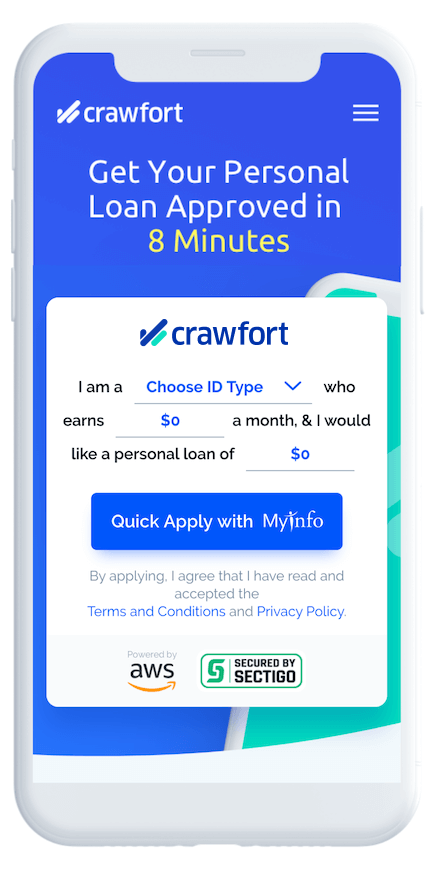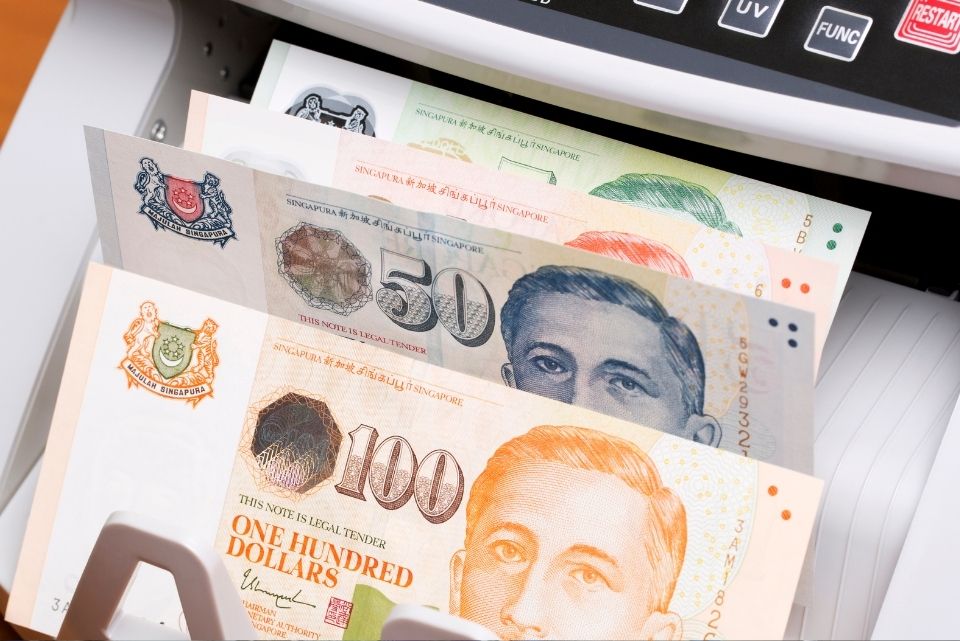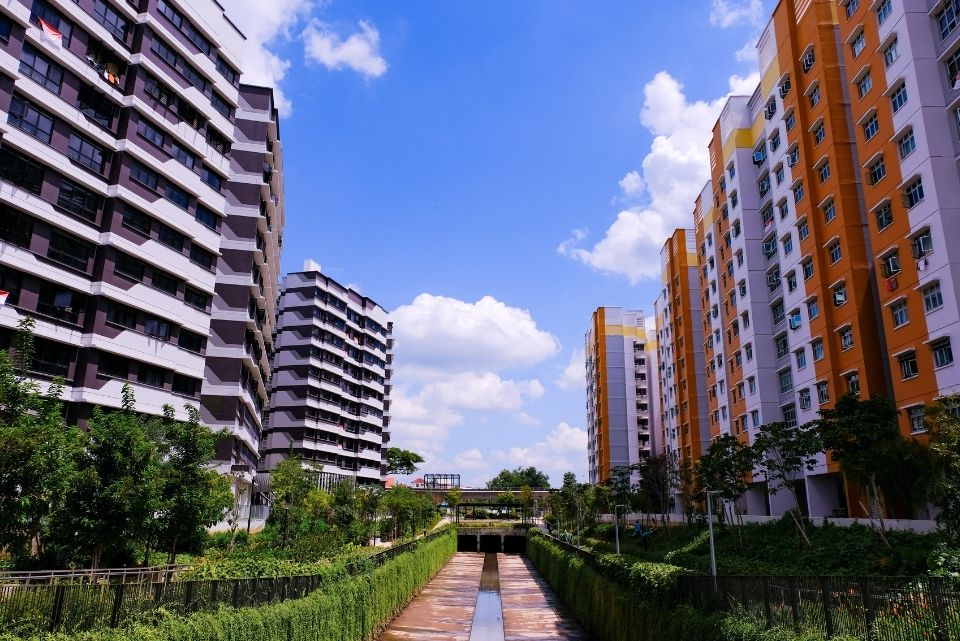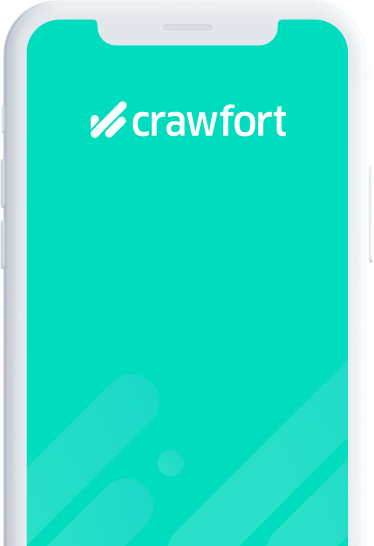
Best Licensed Moneylenders in Singapore: Guide to Borrowing Loans from Legal Lenders
Are you short of funds and planning to borrow from the best licensed money lender in Singapore? But before that, you must first understand the
Are you having a hard time paying off your outstanding debts? Apply now for an urgent debt consolidation loan. Take control of your finances and achieve financial freedom.
At Crawfort, it only takes 8 minutes to get your loan approved.


Our plans are tailored to your needs. So you can worry less and enjoy more. These are our commitments to you.
As one of the most trusted personal loan providers in Singapore, we have disbursed more than 200,000 loans since 2011. We have won an award from Singapore’s Prestige Brand Awards 2019, and will continue to provide high-quality service and care for our customers.
Every step of our loan process is tailored to your convenience. We have digitalised everything from application to credit scoring to payment. Repayments are even simpler. Just pay through any SAM/AXS machines and you’re good to go.
Privacy protection is our top priority. Our servers are encrypted with state-of-the-art technology. You’ll never have to worry about us divulging your information to anyone.
Consolidating your debts can be the answer you need. Find out how paying off all of your bills at once will help you reach debt freedom sooner, simplify your finances, and possibly even cut your interest rates.
The following are some of the key benefits of a debt consolidation loan:

Debt consolidation loan helps you organise your payment. It lets you pay off all of your current debts, including credit card debts, personal loans, and other financial obligations, with a convenient monthly instalment.

Avoid the high interest rates associated with your existing debts, such as credit cards with consolidation loans. You can pay off your debt more quickly by allocating more cash towards monthly payments when you secure a much lower interest rate. Take charge of your money and speed up the process of being debt-free.

A bad credit score can be caused by missed repayments of your outstanding debts. And, in reality, this can happen due to struggling to repay multiple debts. By consolidating your debts, you can conveniently manage your repayments and get rid of outstanding debts. However, remember to pay off your debt consolidation loan on time to improve your credit score.

Having high-interest credit card debt might make it difficult to get out and make you feel like you’ve fallen into a debt trap. A debt consolidation loan offers fixed payback periods and lower interest rates. This makes it possible to pay off debt and get financial freedom faster.

By consolidating multiple debts into one, you simply have to monitor and handle one monthly repayment. As a result, the hassle of managing several due dates, interest rates, and repayment amounts can be avoided. Additionally, this gives you an overview of your total debt and your upcoming repayment schedules, which will enable you to more efficiently plan your monthly budget and repayment.

As debt consolidation often comes with lower interest compared with high-interest credit card debts, this can significantly reduce your total payment and make the debt more manageable. Furthermore, it offers extended loan tenure, which also results in lower monthly instalments. This can free up cash flow for other essential expenses or financial goals.
Debt consolidation loan is an unsecured debt that you take out for the purpose of repaying your outstanding debts. The licensed money lenders offer a single collateral-free loan ideally designed to help you manage multiple debts. This has a much lower interest rate than what you were paying on your individual debts. Your monthly repayments can be reduced as a result, which would lead to easy debt repayment management.
A debt consolidation plan, or DCP, is a debt refinancing programme in Singapore that can consolidate outstanding amounts from multiple unsecured credit facilities, including personal loans and credit cards, into a single loan with a participating financial institution. Repayment is made easier by combining several instalments into a single monthly payment.
However, you need to remember that among the eligible debts are credit card balances and personal loans that are unsecured are usually covered by DCP.
Nonetheless, some loan categories are not included, including joint accounts, home improvement loans, student loans, health care loans, and credit facilities for businesses.
Currently, there is a wide range of financial institutions in Singapore providing DCPs, giving borrowers a selection of options. Participating institutions in the programme at the moment include sixteen major banks, including DBS Bank, HSBC, Citibank, and others.
You have to be able to fulfil the following requirements in order to be qualified for a debt consolidation plan:
Please note that even if you fulfil the specified income requirements, final approval is subject to evaluation by specific financial institutions because the DCP is a commercial offering.
Moreover, to apply for a debt consolidation plan, be sure to prepare the following documents:
Here are some circumstances where you may need to consolidate your debts:
If you are having a hard time repaying multiple loans and bills due each month, this is a sign that you might benefit from taking out a debt consolidation loan.
Combining several repayments into one can improve the way you handle finances.
For instance, you obtain a debt consolidation loan; upon approval, the lender will transfer a certain sum of money to you in order to settle the balances owed to your creditors.
High interest rates have the potential to keep you in a debt cycle, particularly if you are unable to make more than the minimum payment each month and have numerous outstanding debts.
Since the principal hardly moves and the interest charges keep mounting, minimum repayments sometimes can hardly cover the interest.
If you are having a hard time repaying these high-interest debts, it’s a sign that you need to consider a debt consolidation loan. By taking a debt consolidation loan, you can take advantage of much lower interest rates, which could result in long-term financial savings and getting out of debt quickly.
If you have a plan to get out of the debt cycle, it is time to take advantage of debt consolidation loans. With a single debt repayment plan, consolidation loans can help you manage your existing repayments. Moreover, it has a much lower interest rate compared to all your existing debts. Therefore, it can help you get out of the debt cycle quickly.
There are various ways that debt consolidation plans can affect your credit score. A credit investigation when applying for debt consolidation may result in a decrease in your score. However, over time, timely repayments on your debt consolidation plan can significantly improve your score.
Furthermore, maintaining timely repayment habits is essential to maximising the potential benefits of debt consolidation, since it’s important to keep in mind that your Credit Bureau Record will reflect your debt consolidation plan.
Taking a personal loan in Singapore can help you to achieve your goals. It is also an ideal solution for your immediate need for cash. But, if this is your first time to take a personal loan, it is essential to get guided.

Are you short of funds and planning to borrow from the best licensed money lender in Singapore? But before that, you must first understand the

Today, you can take advantage of various enticing credit card deals that offer benefits like bonus miles and up to 10% cashback. These deals can

In Singapore’s dynamic financial landscape, a cash advance allows individuals to access funds quickly for immediate needs. A cash advance lets you get money quickly,

In Singapore’s dynamic property market, homeowners are constantly seeking ways to optimise their financial commitments. Switching your HDB loan to a bank loan can be

Credit cards have become an indispensable tool for managing personal finances, offering convenience and the ability to make purchases both online and offline. A key

Starting or growing a small business in Singapore often comes down to getting enough capital. For many budding entrepreneurs, figuring out business funding can feel
